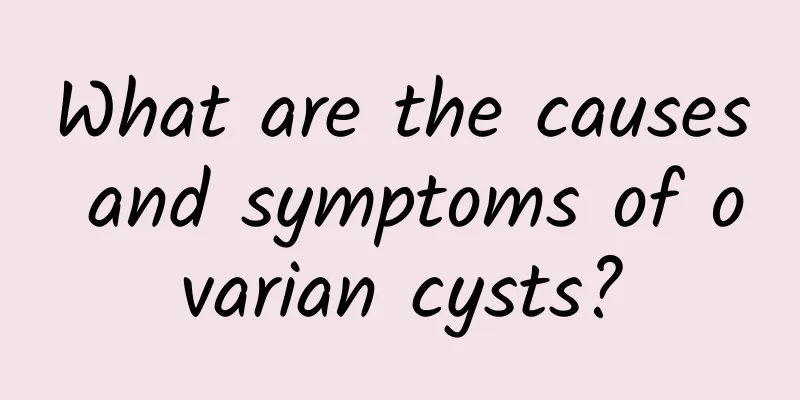What are the causes and symptoms of ovarian cysts?

|
Ovarian cysts are a common gynecological disease in women. Ovarian cysts have no obvious clinical manifestations in the early stages, so they are often discovered during gynecological examinations when patients seek medical treatment for other diseases. So what factors cause ovarian cysts and what are the symptoms? Causes: 1. Genetic factors According to statistics, 20% to 25% of ovarian tumor patients have a family history. 2. Endocrine factors The ovaries are important organs for ovulation and secretion of gonadal hormones. Ovarian tumors often occur during the reproductive age. Clinically, the basic pathophysiological change in many patients with ovarian cysts and polycystic ovary syndrome is that the ovaries produce too much androgen, and the excessive production of androgen is the result of the synergistic dysfunction of multiple endocrine systems in the body. 3. Lifestyle factors Long-term bad diet structure, living habits, and excessive psychological stress can lead to physiological ovarian cysts and true ovarian tumors. 4. Environmental factors Food contamination, such as plant growth hormones used in vegetables, and hormone ingredients such as clenbuterol in formula feeding of livestock and poultry. In recent years, with the improvement of living standards and changes in eating habits in my country, as well as the abuse of hormone drugs and tonics such as breast augmentation, weight loss, and anti-aging by some young and middle-aged women, the high incidence and younger age of ovarian tumors may also be related. 5. Bad living habits Bad living habits, excessive psychological stress and other factors cause excessive acidification of the body, which reduces the overall function of the human body, causing kidney deficiency, which in turn causes the metabolic cycle in the lower part of the body to slow down, resulting in endocrine disorders, decreased immune function, and ultimately ovarian cysts; Clinical symptoms: 1. Abdominal pain: Patients often suffer from abdominal pain, especially sudden abdominal pain. 2. Lower abdominal discomfort: The patient has a feeling of distension and heaviness in the lower abdomen or iliac fossa. 3. Abnormal menstruation or increased body hair: abnormal menstruation, irregular bleeding, increased body hair, obesity or even amenorrhea. 4. Increased waist circumference and abdominal mass: The waist and abdomen become larger, you can feel a mass when pressing your stomach, and you feel bloating and discomfort. 5. Compression symptoms: difficulty urinating, urine retention, urgency or difficulty in defecation. |
<<: What should I do if I cannot get a tetanus shot due to skin test allergy?
>>: Little tips for maintaining your ovaries, don’t say you don’t know any of them!
Recommend
What should I do if my vulva is itchy during menstruation?
As a woman, you have to experience this once ever...
How to stand with lumbar disc herniation
Lumbar disc herniation is very troublesome for yo...
Drinking these two kinds of wine at the same time can actually induce liver cancer
In daily life, it is common for relatives and fri...
All the reactions of taking Chinese medicine to eliminate diseases
Many people like to take Chinese medicine to slow...
What are the recurrences and dangers of genital warts and herpes?
The high recurrence rate of condyloma and herpes ...
How to decoct Chinese medicine most effectively?
Don't underestimate the method of decocting C...
What diseases can agarwood cure?
Agarwood is a traditional Chinese medicinal mater...
Can pregnant women take medicine for diarrhea?
Pregnant women need to be very clear about their ...
What causes pain in the arm meridians?
We need to use our arms to do many things in our ...
Chronic bronchitis medicine
Bronchitis is a common disease. As the air qualit...
Danggui Liuhuang Decoction Taboo
Chinese herbal decoction is a traditional solutio...
What is the reason for the body to feel cold?
With the arrival of cold winter, the days begin t...
Can I cupping my inner thigh?
Cupping is a common method of treating diseases i...
What does a six month old fetus look like?
After six months of pregnancy, the fetus is growi...
How to deal with boils on the body
Skin diseases are very common diseases. This type...









